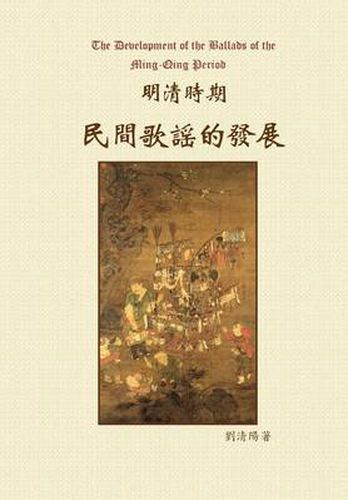Readings Newsletter
Become a Readings Member to make your shopping experience even easier.
Sign in or sign up for free!
You’re not far away from qualifying for FREE standard shipping within Australia
You’ve qualified for FREE standard shipping within Australia
The cart is loading…






This title is printed to order. This book may have been self-published. If so, we cannot guarantee the quality of the content. In the main most books will have gone through the editing process however some may not. We therefore suggest that you be aware of this before ordering this book. If in doubt check either the author or publisher’s details as we are unable to accept any returns unless they are faulty. Please contact us if you have any questions.
When people sang along with instruments, it was known as "Ge", and when Ge got spread by words of mouth it became "Yao". Geyao, or ballads, came from the civilians and expressed their joys and sorrows. Ballads also carried the extraordinary ingenuities of ordinary people at the time. Few of the ancient ballads were recorded because they mostly spread among the illiterate commoners, but those that were passed on in records are frequently quoted by modern historians because they represent the voice of the people and provided valuable insight into their lives. The ballads of the Ming-Qing period are discussed in this book. Also addressed in this book are the spread of the melodies and words of the popular ballad and the social roles of political ballads, rhymes, adages, proverbs and nursing hums. The book provides a curious and profound perspective for both ballad fans and history enthusiasts.
$9.00 standard shipping within Australia
FREE standard shipping within Australia for orders over $100.00
Express & International shipping calculated at checkout
This title is printed to order. This book may have been self-published. If so, we cannot guarantee the quality of the content. In the main most books will have gone through the editing process however some may not. We therefore suggest that you be aware of this before ordering this book. If in doubt check either the author or publisher’s details as we are unable to accept any returns unless they are faulty. Please contact us if you have any questions.
When people sang along with instruments, it was known as "Ge", and when Ge got spread by words of mouth it became "Yao". Geyao, or ballads, came from the civilians and expressed their joys and sorrows. Ballads also carried the extraordinary ingenuities of ordinary people at the time. Few of the ancient ballads were recorded because they mostly spread among the illiterate commoners, but those that were passed on in records are frequently quoted by modern historians because they represent the voice of the people and provided valuable insight into their lives. The ballads of the Ming-Qing period are discussed in this book. Also addressed in this book are the spread of the melodies and words of the popular ballad and the social roles of political ballads, rhymes, adages, proverbs and nursing hums. The book provides a curious and profound perspective for both ballad fans and history enthusiasts.